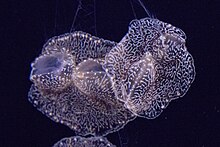| Coeloplana meteoris | |
|---|---|

| |
| Two Coeloplana meteoris, with tentacles streaming | |
| Scientific classification | |
| Domain: | Eukaryota |
| Kingdom: | Animalia |
| Phylum: | Ctenophora |
| Class: | Tentaculata |
| Order: | Platyctenida |
| Family: | Coeloplanidae |
| Genus: | Coeloplana |
| Species: | C. meteoris |
| Binomial name | |
| Coeloplana meteoris Thiel, 1968 | |
Coeloplana meteoris, (previously known as Benthoplana meteoris) is a species of benthic comb jelly native to the Indo-Pacific region that has also been found in the Arabian-Persian gulf.
Description
Like other platyctenids, it has a flattened underside and two tentacles that extend from tentacle sheathes on its aboral side. These sheathes are more prominent in Coeloplana meteoris than in other species of platyctenids, giving it its recognizable shape.
Ecology
This comb jelly lives freely on soft sediment, unlike other benthic ctenophora which are typically parasitic. They are hermaphroditic like most platyctenids, and are also capable of asexual reproduction via body fission and regeneration.
References
- WoRMS (1998). "Coeloplana meteoris Thiel, 1968". WoRMS. World Register of Marine Species. Retrieved 27 February 2024.
- ^ Bruno Welter Giraldes (2019). "The first record of the Indo-Pacific benthic ctenophore Coeloplana (Benthoplana) meteoris (Ctenophora: Coeloplanidae) in the Arabian-Persian Gulf". Journal of Asia-Pacific Biodiversity. 12 (3): 467–469. doi:10.1016/j.japb.2019.03.012. hdl:10576/11524. ISSN 2287-884X.
- ^ Alamaru, Ada; Brokovich, Eran; Loya, Yossi (2016). "Four new species and three new records of benthic ctenophores (Family: Coeloplanidae) from the Red Sea". Marine Biodiversity. 46 (1): 261–279. Bibcode:2016MarBd..46..261A. doi:10.1007/s12526-015-0362-4. S2CID 255577612. Retrieved 28 February 2024.
- "9". Invertebrate zoology : a tree of life approach. CRC Press, Taylor & Francis. 2021. p. 140. ISBN 9781482235814.
| This article needs additional or more specific categories. Please help out by adding categories to it so that it can be listed with similar articles. (February 2024) |
This ctenophore-related article is a stub. You can help Misplaced Pages by expanding it. |